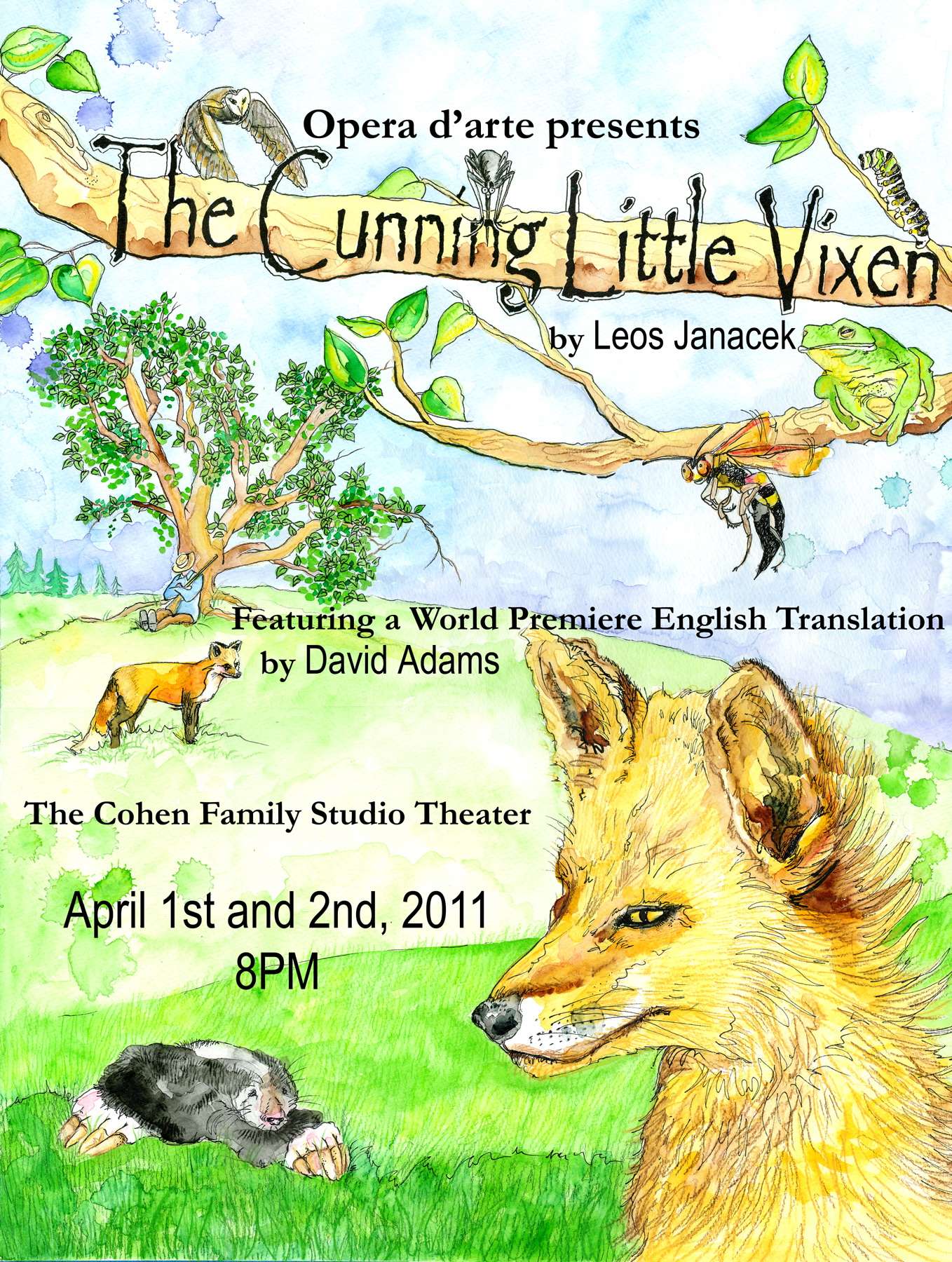|
Back
Feathered and Furry Forest and Farm Fauna Cincinnati
Cohen Family Studio Theatre
04/01/2011 - & April 2, 2011
Leos Janácek: The Cunning Little Vixen (arrangement Jonathan Dove)
Kevin DeVries (Badger), Laura Dobroth (Vixen), Elizabeth Gautche (Hen), Danielle Adams (Rooster), Alison Kaufman (Cricket), Edward Nelson (Forester), Andrew King (Frantík), Eric Jurenas (Frog), Chelsea Major (Forrester's wife), Lani Stait (Grasshopper), Emmett O’Hanlon (Harasta), Elliana Kirsch (Jay), Stephanie Schoenhoffer (Dog), Tyler Stahl (Mosquito), Tara Morrow (Páskova), Ellen Chew (Owl), Ryan Slone (Pásek), Wayne Shuker (Pepík), Michael Hewitt (Priest), Josh Wheeker (Schoolmaster), Emma Siegel (Woodpecker), Natalie Eccleston (Fox)
Lauren Bridges, Kelly Hamm, Rashmi Joglekar, Katherine Jennings, Jessine Johnson, Maggie Dougherty, Annalise Dzwonczyk, Ryan Devens and Richard Oliver (Ensemble), Brett Scott (Conductor), Teren Shaffer (Chorus Master)
Kenneth Shaw (Director), Lakota West Theater (Set Design), Sarah Hauck/Dean Mogle (Costumes), Andrew Wellons (Lighting Design), Alexandra Kassoup (Choreography), Wesley Lawrence (Movement)

A vixen is captured, escapes, mates with a fox, has a litter, is shot by a hunter and dies. In less than 20 words, that is the plot of Leos Janácek's seventh opera, The Cunning Little Vixen. Feeling autumnal pangs of unrequited love for his muse, Kamila Stösslová, Janácek worked on this opera, at age 70, while contemplating life's puzzling journey from childhood to old age. Ahead still lay the cynicism of The Makropoulos Affair and the Dostoyevskyan abyss of From the House of the Dead. The Cunning Little Vixen is dramatically and musically worlds apart from the chilly microcosms of Janácek's other and better-known operas, yet similarly rooted in the idiosyncrasies of the composer's Czech homeland. The opera's full-circle ending harking back to the top of Act I is deeply moving, yet never maudlin. This is a tough love story and a plain-spoken allegory about the eternal cycle of life and death. Its tone is resigned, its vision immense.
Janácek has his share of challenges and rewards for the singer of his music. The vocal lines are tricky, often jagged and intrinsically married to the peculiarities of the daunting Czech language. When they cut loose, the melodies soar in a folksy cantabile uniquely Slavic and lyrical. A good English translation can go a long way to make this opera accessible to a large audience, and David Adams has delivered an eminently singable and humorous translation in colloquial and contemporary English without resorting to any unwarranted slang. Most importantly, he has conquered the difficulty of the Czech language's insistence on first syllable stress without radically altering Janácek's rhythmic patters. No small feat.
Conductor Brett Scott must have a place in opera heaven reserved for him thanks to his extraordinary and loving preparation of this challenging score. His singers – a large cast of more than thirty students – ranges from the promising to the immensely-gifted – all fresh-voiced young people familiarizing themselves with the music of a modern master. Scott leads an 8-piece chamber ensemble – strings, keyboards, percussion – in a tidy reduction of the full orchestral score by Jonathan Dove. The young musicians play Janácek's score with finesse and sensitivity under Scott's firm guidance.
Director Kenneth Shaw never stoops to cuddly cuteness but maintains respect for both the parallels and the differences between the animals and the humans of Janácek's pantheistic world. Shaw both mines the work for humor and strikes the right notes of awe in the poignant final moments of Act III. "Opera d’arte" is the adventurous group that Shaw helms – a labor of love that ranges from building the sets to training his young singing actors and putting together a production of this 90- minute opera on a shoestring. His rock-solid work and his vision are supported by the clever costumes of student designer Sarah Hauck – many of them the original designs of CCM's Dean Mogle. Also crucial to the evening's success are the imaginative lighting of student Andrew Wellons and the choreography of Alexandra Kassoup. Out of a cast of thirty-plus singers, one is hard-put to single out the finest among the fine. Nevertheless, special kudos must go to the young soprano Laura Dobroth for her charming acting and singing of the title role and to baritone Edward Nelson's solid vocalism and subtle acting in the high-lying and challenging role of the Forester.
Drawing parallels between the animal and human worlds and accepting the coexistence of cruelty and beauty in both, the Czech composer of Jenůfa and Kátia Kabanová created in this opera an enchanting, moving and ultimately illuminating cradle-to-grave fable, here compellingly brought to life by Opera d'arte and its youthful and brave band of brothers and sisters – all in the guises of feathered and furry forest and farm fauna. Plus some humans.
Rafael de Acha
|